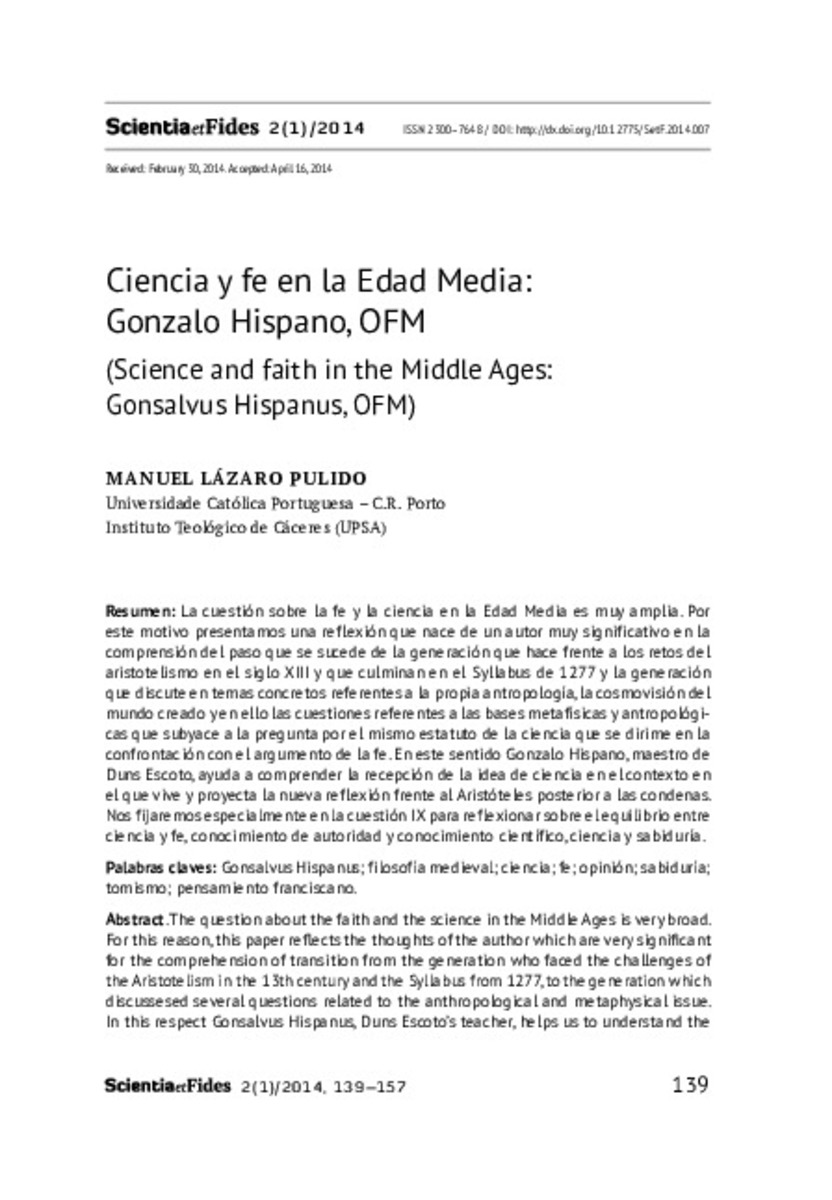Full metadata record
| DC Field | Value | Language |
|---|---|---|
| dc.creator | Lázaro-Pulido, M. (Manuel) | - |
| dc.date.accessioned | 2014-08-26T09:23:54Z | - |
| dc.date.available | 2014-08-26T09:23:54Z | - |
| dc.date.issued | 2014 | - |
| dc.identifier.citation | Lázaro-Pulido, Manuel. “El principio de razón suficiente y la ciencia”, Scientia et Fides, Vol. 2, n. 1, 2014, pp.139-158. | es_ES |
| dc.identifier.issn | 2300-7648 | - |
| dc.identifier.uri | https://hdl.handle.net/10171/36397 | - |
| dc.description.abstract | La cuestión sobre la fe y la ciencia en la Edad Media es muy amplia. Por este motivo presentamos una reflexión que nace de un autor muy significativo en la comprensión del paso que se sucede de la generación que hace frente a los retos del aristotelismo en el siglo XIII y que culminan en el Syllabus de 1277 y la generación que discute en temas concretos referentes a la propia antropología, la cosmovisión del mundo creado y en ello las cuestiones referentes a las bases metafísicas y antropológi- cas que subyace a la pregunta por el mismo estatuto de la ciencia que se dirime en la confrontación con el argumento de la fe. En este sentido Gonzalo Hispano, maestro de Duns Escoto, ayuda a comprender la recepción de la idea de ciencia en el contexto en el que vive y proyecta la nueva reflexión frente al Aristóteles posterior a las condenas. Nos fijaremos especialmente en la cuestión IX para reflexionar sobre el equilibrio entre ciencia y fe, conocimiento de autoridad y conocimiento científico, ciencia y sabiduría. | es_ES |
| dc.description.abstract | The question about the faith and the science in the Middle Ages is very broad. For this reason, this paper reflects the thoughts of the author which are very significant for the comprehension of transition from the generation who faced the challenges of the Aristotelism in the 13th century and the Syllabus from 1277, to the generation which discussesed several questions related to the anthropological and metaphysical issue. In this respect Gonsalvus Hispanus, Duns Escoto’s teacher, helps us to understand the reception of the idea of science in the post-condemnation context. We specially pay our attention to the 9th Question in order to consider the relationship between science and faith, knowledge of authority and scientific knowledge, science and wisdom. | es_ES |
| dc.language.iso | spa | es_ES |
| dc.publisher | Universidad Nicolás Copérnico de Torun | es_ES |
| dc.rights | info:eu-repo/semantics/openAccess | es_ES |
| dc.subject | Gonsalvus Hispanus | es_ES |
| dc.subject | Filosofía medieval | es_ES |
| dc.subject | Ciencia | es_ES |
| dc.subject | Fe | es_ES |
| dc.subject | Opinión | es_ES |
| dc.subject | Sabiduría | es_ES |
| dc.subject | Tomismo | es_ES |
| dc.subject | Pensamiento franciscano | es_ES |
| dc.subject | Gonsalvus Hispanus | es_ES |
| dc.subject | Medieval philosophy | es_ES |
| dc.subject | Science | es_ES |
| dc.subject | Faith | es_ES |
| dc.subject | Opinion | es_ES |
| dc.subject | Wisdom | es_ES |
| dc.subject | Thomism | es_ES |
| dc.subject | Franciscan thought | es_ES |
| dc.title | Ciencia y fe en la Edad Media: Gonzalo Hispano, OFM | es_ES |
| dc.title.alternative | Science and faith in the Middle Ages: Gonsalvus Hispanus, OFM | es_ES |
| dc.type | info:eu-repo/semantics/article | es_ES |
Files in This Item:
Statistics and impact
Items in Dadun are protected by copyright, with all rights reserved, unless otherwise indicated.






